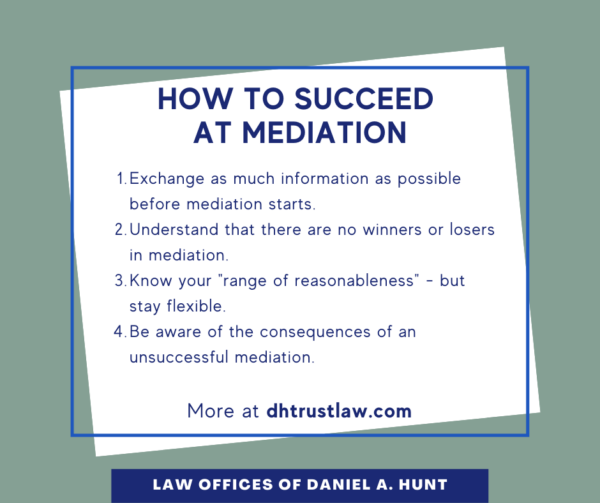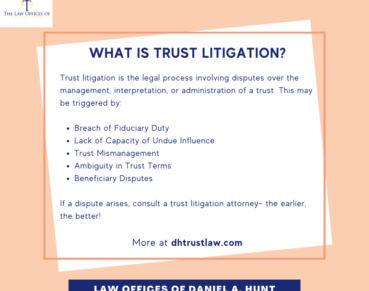How to Succeed at Mediation

If you’re involved in a trust or estate conflict, you may want to try an alternative mediation before your case proceeds to trial. Mediation is a form of alternative dispute resolution. If successful, mediation can save significant time and money for both parties involved. Here are four tips on how to succeed at mediation.
Tip 1: Exchange as much information as possible prior to mediation.
In a successful mediation, both parties reach an agreement and resolve their legal conflict. Often a lack of information poses the biggest obstacle to making major decisions in mediation. Both parties should have requested and received complete and accurate information prior to the mediation.
Nothing will stall the mediation process or prevent you from reaching a settlement agreement like missing information. Make sure that you have requested and received adequate information from the opposing side before going to mediation. Otherwise, you risk needing to return to mediation again once you’ve conducted more discovery.
Tip 2: Understand that there are no winners or losers in mediation.
A mediator’s job is to listen to both sides’ positions and help you find a mutually tolerable compromise. A mediator does not deem one side the winner and the other side the loser. Instead, they strive to remain neutral and deal fairly with both sides. If you go into mediation expecting to win the mediator over to your side and have them advocate for you getting everything you want, you’ll likely be disappointed.
Keep realistic expectations and understand that you will need to give something up in order to reach a compromise. Typically, both sides end up roughly equally unhappy with the settlement agreement. No one gets everything they want in the end. But when you save the time and money of a court trial, both sides win.
Tip 3: Know your “range of reasonableness” – but stay flexible.
Before mediation, work with your attorney to determine your monetary “range of reasonableness”. This range should include the minimum dollar amount you wish to receive in mediation up to the best possible settlement amount you could expect.
When you go into mediation, stay flexible with this range of reasonableness. Additional information may come to light that could cause you to either lower or decrease your original range.
If at any point during mediation you reach a point within or close to your range, you may be close to achieving a settlement agreement. If you cannot get anywhere near that range, you may need to either conduct more discovery or proceed to a court trial.
Tip 4: Be aware of the consequences of an unsuccessful mediation.
If mediation fails and the disputing parties are unable to find a mutually accepted solution, you will likely proceed to a court trial. This process can take many months, including trial preparation, obtaining a court date, attending a Mandatory Settlement Conference, and participating in the actual trial.
All of these steps will be costly for an unknown result. The outcome of a court trial is never guaranteed. It will be decided by one individual – the judge – who may or may not view the evidence in your favor. This is why we encourage clients to try mediation before going to trial and to make a genuine effort to reach a settlement if at all possible.
To achieve the best results possible in mediation, be sure to select a skilled trust & estate attorney and an experienced mediator. If you have any questions about how to succeed at mediation or would like a referral to a mediator, feel free to contact our office.
Law Offices of Daniel A. Hunt
The Law Offices of Daniel A. Hunt is a California law firm specializing in Estate Planning; Trust Administration & Litigation; Probate; and Conservatorships. We've helped over 10,000 clients find peace of mind. We serve clients throughout the greater Sacramento region and the state of California.




